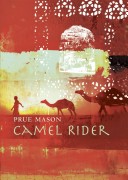 Camel Rider
Camel Rider
Written by Prue Mason
Charlesbridge Publishing, 2007, 172 pp.
ISBN: 9781580893145
Adam and his family are from Australia and live in a compound with other foreigners who work in a present day fictional city of Abudai in the Middle East. He has an Indian servant ‘Chandra’ whom his sister mimics. When there is an attack and war breaks out, all expatriates try to escape; Adam, whose family is away from the compound, runs away from other families in an effort to find his lost dog. Alone and without resources in the desert, Adam meets Walid, an abused camel boy from Bangladesh, who has been bound and left to die by his cruel masters. Adam ends up saving him by cutting the ropes that bind him. In trying to find their way back to Abudai, they come across Walid’s ruthless masters and corrupt Bedouins who negotiate a deal and try to return Adam to his parents for the 10,000 dollars that has been promised as reward money.
The book is a first person narrative from the viewpoints of both male characters, with the chapters alternating between the perspectives of Adam and Walid. The font and the dialogues are modified drastically as the chapters move from one character to another. The first chapter is Adam’s and the reader is exposed to standard English with no confusions in the grammatical structures of the dialogues, not reflecting an Australian accent or any alteration in the diction. Walid’s perspective in the second chapter provides a completely different vision from that of the organized Middle Eastern world that Adam lives in. The setting and the dialogues alter completely and are strange, ungrammatical and confusing to an English speaking audience. After the characters meet in chapter 8, most of the dialogues are from Adam’s perspective with only a few garbled ones from Walid. By using this strategy the author seems to be trying to reflect dialogues spoken in another language. But any language must be grammatically sound within the structure of that language or dialect so the question arises–Why project Walid’s language in a ludicrous manner? Further, the content of the dialogue from Adam’s perspective projects a self-assured young man who is intelligent in comparison to Walid, who comes through as crazy and animal-like when he says “I sniff the morning air” (p.17) and Adam thinks, “He looks like a toothless monkey” (72).
The book’s title is confusing as this is more of Adam’s tale than the ‘camel rider’ Walid. Walid is described as a dirty monkey-like person who is small and ends up ruthlessly killing a goat and trying to take Adam’s money. He also rides a camel well and ‘spits like a champion.’ Adam, on the other hand, gives Walid money and his Swiss knife, loves animals and hates it when Walid kills the goat. He comes through as decent, level headed and courageous.
Arabic words are used incorrectly by the author who claims she has lived in Dubai. Most commonly she confuses Islamic terminology in Allah Akbar ‘God Great” with “God Is Great” Allah ho Akbar. Salaam alayku is presented as Alaykum as-salaam which is the response to the previous “peace be upon you.” Walid is a respected name for Muslim males even though the book says that it is not a name at all. Dish dash is a “Thawb/garment” and is called a dishdasha within some regions. Babu is “mister” in Urdu, not “father” in Arabic.
Even though the author may have had good intentions in writing a story that speaks about the universality of friendship conquering difference, the manner in which she has written this book is questionable as the portrayal of both the characters and their cultural differences is too far removed from each other. The Eastern characters are projected as invariable needy and Western characters as upright and as saviors. The author is Australian and has visited the Middle East many times. She writes for The School Magazine in Australia and is an editor there. She has also written in a children’s magazine in Dubai U.A.E.
The same thematic threads can be found in Samir and Yonatan by Daniella Carmi (2002) where a Muslim and a Jewish boy learn to get along with each other, overcoming societal distrust, and in Elizabeth Laird’s A Little Piece of Ground (2006) where several Muslim boys band together with a Christian boy to create a place to play soccer within war torn Palestine. There are numerous picture books on the Middle East, for example, Sami and the Time of Trouble (1995) and The Day of Ahmad’s Secret (1995), by Florence Heidi, Judith Gilliland and Ted Lewin, that project the concerns of illiteracy and war in present day Middle East. Betsy Lewin’s What’s the Matter Habibi? (2004) and Jonathan London and Ted Lewin’s Ali, Child of the Desert (1997) are problematic in depicting contemporary Middle Eastern countries as frozen in the past.
Seemi Aziz, Oklahoma State University, Stillwater, OK
WOW Review, Volume II, Issue 4 by Worlds of Words is licensed under a Creative Commons Attribution-NonCommercial-ShareAlike 4.0 International License. Based on work at https://wowlit.org/on-line-publications/review/ii-4/

I like this story so much Nasreen’s.